Related Research Articles
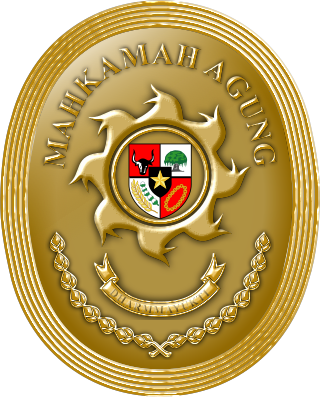
The Supreme Court of the Republic of Indonesia is the independent judicial arm of the state. It maintains a system of courts and sits above the other courts and is the final court of appeal. It can also re-examine cases if new evidence emerges.

The Constitutional Court of the Republic of Indonesia is one of the apex courts in Indonesia along with the Indonesian Supreme Court. Its primary role is reviewing the constitutionality of statutes (undang-undang). It also has other functions, including resolving disputes over the powers of state institutions, settling disputes over the results of general elections, deciding on the dissolution of political parties, and supervising impeachment. The last two functions have never been exercised by the Court.

The Judicial Commission of Indonesia was established as a consequence of the third amendment to the Constitution of Indonesia ratified by the Indonesian People's Consultative Assembly on 9 November 2001. The Commission's duty is to monitor the performance of judges, advise the House of Representatives on judicial appointments and review community complaints about the behavior and fairness of presiding judges.

Patrialis Akbar is an advocate and politician who was member of the Constitutional Court Justice of the Indonesian Constitutional Court for the period 2013-2017 from Padang, West Sumatra. He has a complete career in three branches of state, legislative, executive and judicial power. He had served as a member of the House of Representatives for two periods.
Harjono is a former judge of the Constitutional Court of Indonesia. He has remained vocal on judicial affairs in Indonesia even after his retirement, expressing support for public humiliation as a punishment for people convicted of graft. In 2016, he also appeared before the Constitutional Court again to testify in favor Jakarta Governor Basuki Tjahaja Purnama's case for the right of incumbent politicians to not take leaves of absence during campaign seasons.
Maria Farida Indrati is a former justice of the Constitutional Court of Indonesia for two terms. During her both terms, she was the only woman among the Court's nine members.

Akil Mochtar is a convicted former-Chief Justice of the Constitutional Court of Indonesia that was indicted for his acceptance of bribery for an election dispute case, prompting President of Indonesia Susilo Bambang Yudhoyono, who'd appointed him, to sign legislation creating a permanent ethics body to supervise the Constitutional Court of Indonesia.

Adnan Buyung Nasution, also known as Adnan Bahrum Nasution was an Indonesian lawyer, advocate, and activist.

Muhammad Hatta Ali is the thirteenth Chief Justice of the Supreme Court of Indonesia.
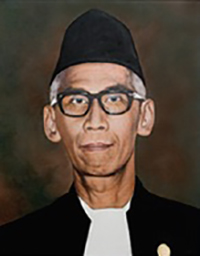
Suryadi was a former Chief Justice of the Supreme Court of Indonesia, as well as the first chairman of the Indonesian Judges Association.
Harifin Tumpa was the twelfth Chief Justice of the Supreme Court of Indonesia as well as the first Deputy Chief Justice of the Supreme Court Indonesia for non-judicial affairs.
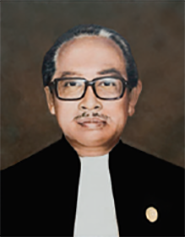
Subekti (1914-1992) was the fourth Chief Justice of the Supreme Court of Indonesia.

Umar Seno Aji (1915–1984) was the fifth Chief Justice of the Supreme Court of Indonesia as well as the fourteenth Indonesian Minister of Law and Human Rights.

Mujono (1927–1984) was the sixth Chief Justice of the Supreme Court of Indonesia as well as the 16th Minister of Law and Human Rights. His appointment to both posts began a line of former military officials predominating in Indonesia's legal system.
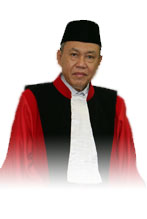
Wahiduddin Adams is currently a justice of the Constitutional Court of Indonesia. He and Aswanto were appointed to the court by the People's Representative Council in March 2014. Adams formerly served as Director General of Legislation at the Ministry of Law and Human Rights.
Ahmad Fadlil Sumadi is a former judge on the Constitutional Court of Indonesia. Sumadi initially served as the registrar of the Constitutional Court between 2003 and 2008, then served as the deputy chief justice of the High Court of Yogyakarta before the Supreme Court of Indonesia appointed him to the Constitutional Court in 2010.
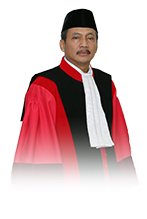
Suhartoyo is currently a justice of the Constitutional Court of Indonesia. Alongside I Dewa Gede Palguna, Suhartoyo was chosen by President Joko Widodo to replace outgoing Justice Ahmad Fadlil Sumadi in January 2015. A former judge from the Denpasar High Court, Suhartoyo's appointment caused controversy due to criticism from the Judicial Commission of Indonesia over his lenience on a Bank Indonesia liquidity scandal when he was serving on the South Jakarta District Court.

I Dewa Gede Palguna is a constitutional law academic who served two terms as a justice of the Constitutional Court of Indonesia. He holds the record for having been the youngest ever justice of the Indonesian Constitutional Court. In February 2020, he was appointed to the ethics council of Indonesia's Child Protection Commission.

Purwoto Gandasubrata was the eighth Chief Justice of the Supreme Court of Indonesia. Alongside the Ministry of Justice officials in the Sixth Development Cabinet, Gandasubrata was a part of a general return of civilian officials to the judiciary of Indonesia in the early 1990s after a period of former military officials dominating the branch from the late 1970s. Gandasubrata had initially served as the chief of the district court of Semarang, as well as the chairman of the regional branch of the Indonesian Judges Association.

Suryono, also spelled Soerjono, was the ninth Chief Justice of the Supreme Court of Indonesia. The reputation of the Supreme Court among legal scholars suffered under his tenure due to Suryono's tendency to reverse seemingly final decisions via what were derisively termed "magic memos," and he was generally regarded as a candidate who would maintain the Supreme Court's subordination to the executive branch. He overturned an administrative court ruling that had lifted a New Order-era ban on Tempo, a popular political commentary magazine.
References
- ↑ Ad Hoc Judges. Tempo, 8 July 2016. Accessed 26 October 2016.
- ↑ Ina Parlina, New bill may threaten judicial transparency. Jakarta Post, 7 December 2015. Accessed 26 October 2016.
- ↑ Adriaan Bedner, Administrative Courts in Indonesia: A Socio-legal Study, pg. 22. Leiden: Martinus Nijhoff Publishers, 2001. ISBN 9789041116338
- 1 2 Sebastian Pompe, The Indonesian Supreme Court: A Study of Institutional Collapse, pg. 47. Ithaca: Cornell Southeast Asia Program, 2005. ISBN 9780877277385
- ↑ Daniel Lev, Legal Evolution and Political Authority in Indonesia, pg. 77. Leiden: Martinus Nijhoff Publishers, 2000. ISBN 9789041114211
- ↑ Sebastian Pompe, Indonesian Supreme Court, pp. 69, 84 & 86.
- ↑ Agus Triyono, Indonesia's Chief Justice Threatens Sanctions for Striking Judges Archived 2016-10-26 at the Wayback Machine . Jakarta Globe, 26 April 2012. Accessed 26 October 2016.
- ↑ Ina Parlina, Court ruling weakens Judicial Commission. Jakarta Post, 8 October 2015. Accessed 26 October 2016.